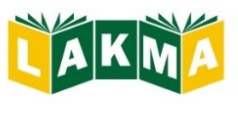MEDIATION IN LANGUAGE LEARNING, TEACHING AND ASSESSMENT
CONFERENCE PROGRAMME
08:00–08:45 REGISTRATION
08:45–09:00 OPENING
09:00–10:00 Session 1. Maria Stathopoulou, ECML, Council of Europe
10:00–11:00 Session 2. Dave Spencer, Macmillan Education
11:00–11:30 BREAK
11:30–12:30 Session 3. Ania Kolbuszewska, Pearson Education
12:30–13:30 Session 4. Dave Spencer, Macmillan Education
13:30–14:00 BREAK
14:00–15:00 Session 5. Ania Kolbuszewska, Pearson Education
15:00–16:00 Session 6. Beata Valungevičienė, LAKMA (in Lithuanian)
16:00–16:15 CLOSING
CONFERENCE FEES
15 EUR for LAKMA 2021 members / 30 EUR for non-members
NO FEE for student members 2021 (registration compulsory) / 5 EUR for student non-members
Registration and payment by 20 October, Wednesday.
Advance payment invoices issued upon request. Letters of guarantee accepted.
LAKMA bank account: SEB LT97 7044 0600 0457 8304
Bank address: Gedimino pr. 12, Vilnius, Lithuania. SWIFT code: CBVILT2X
REGISTRATION FORM https://cutt.ly/OEtVou7
Zoom link will be sent one day before the event.
CERTIFICATES will be issued by LAKMA in cooperation with UAB “Šviesa” mokymo centras.
The Conference programme is accredited by UAB “Šviesa” mokymo centras.
More information: admin@lakmaonline.lt
CONFERENCE SPEAKERS AND ABSTRACTS




2021 LAKMA NACIONALINĖ ASAMBLĖJA – spalio 23 d.
DARBOTVARKĖ
09:30 – 09:50 Registracija / Prisijungimas
09:50 – 10:00 Atidarymas
10:00 – 10:15 Ona Marija Vyšniauskaitė, Britų Taryba Lietuvoje
10:15 – 10:30 Caitlin Nettleton, JAV Ambasada Vilniuje
10:30 – 10:45 Jennifer Uhler, Regional English Language Office
10:45 – 11:00 Živilė Lazauskienė, ASSIST programa
11:00 – 11:15 Miglė Ogorodnikovienė, Oxford University Press, Humanitas
11:15 – 11:30 Iveta Vitola, Pearson
11:30 – 11:45 Jakub Bąk, Macmillan, Rotas
11:45 – 12:00 Violeta Liudvinovičienė, NGL, Cambridge University Press, Krisostomus
12:00 – 12:15 Pertraukėlė
12:15 – 12:45 Kristina Urbonienė, LAKMA
12:45 – 13:00 Diana Galatiltienė, Inga Veberienė, LAKMA, IATEFL
13:00 – 13:15 Uždarymas. Loterija
13:15 – 14:00 LAKMA Valdybos posėdis
Asamblėja yra privaloma LAKMA nariams. Dalyvio pažymėjimai neišduodami. Registruotis nereikia.
Renginys vyks ZOOM platformoje, nuorodą atsiųsime visiems nariams dieną prieš renginį.
